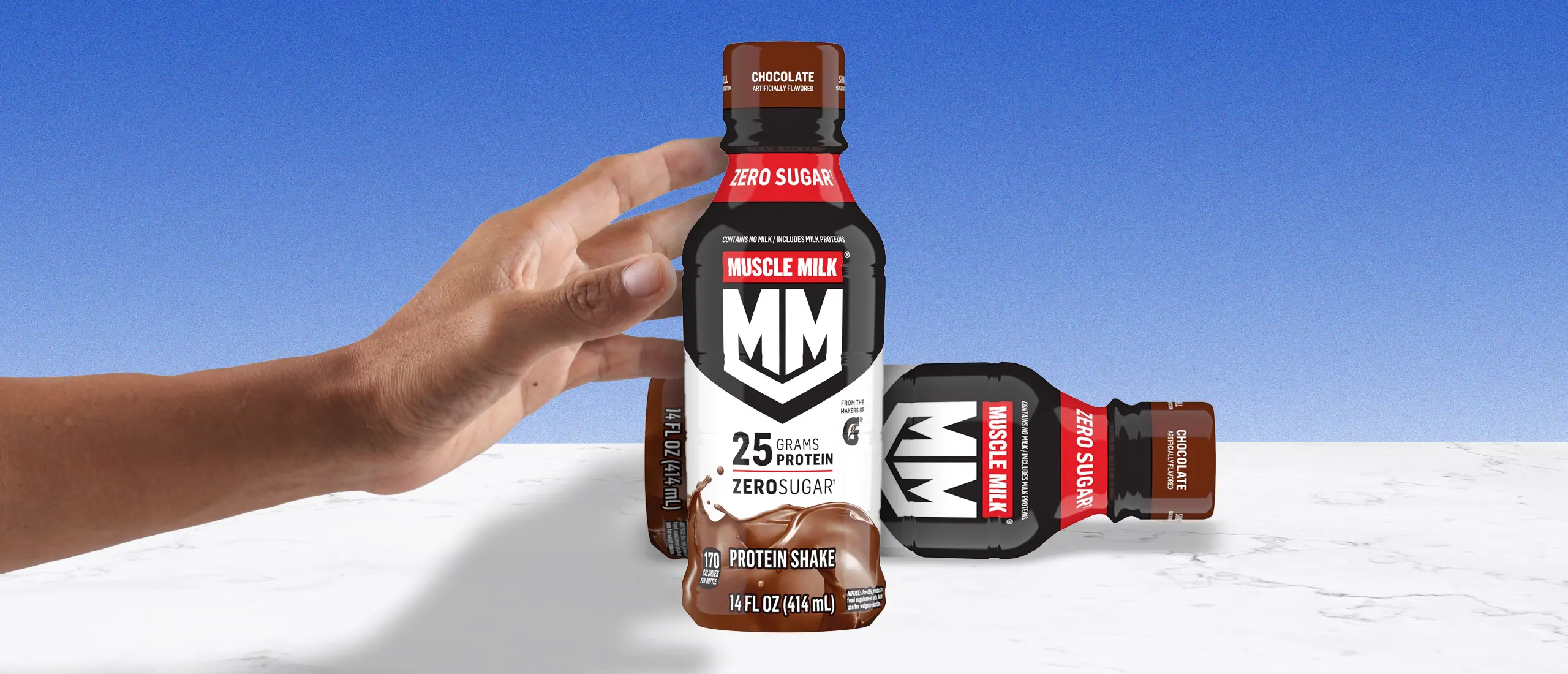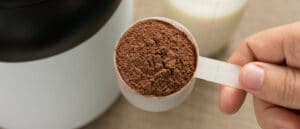Is Muscle Milk Good For You? Maybe. An R.D. Explains
- By Matthew Kadey, M.S., R.D.
- April 5, 2024
When you’re pressed for time, or frankly just feeling too lazy to blitz up a post-gym protein shake, Muscle Milk is a convenient alternative. The ready-made drink is a relatively affordable protein powerhouse, and is undeniably tasty. That said, it also contains some questionable ingredients.
Is Muscle Milk Good For You?
Yes and no. If you’re in a pinch or you struggle to regularly take in enough protein, Muscle Milk packs 25 grams of easy, high-quality protein. But it also contains additives like artificial sweeteners and emulsifiers, which may wreak havoc on your gut microbiome and have been linked to heart disease (1, 2, 3, 4). Blending up your own post-workout protein shakes or smoothies with a healthier protein powder, or eating high-protein whole foods like chicken, tofu, or yogurt is a better bet.
What’s Good About Muscle Milk?
Not everything about Muscle Milk is great, but there are a few big wins that make it a solid option in a pinch.
Solid amount of protein
Muscle Milk is loaded with protein. The original and plant-based Muscle Milks both contain 25 grams of protein, while Muscle Milk Pro contains 40 grams a pop. Protein is important for building and maintaining lean muscle mass and staying satiated throughout the day.
To build muscle, shoot for 1.4 to 2.0 grams of protein per kilogram of body weight (0.7 to 0.9 grams per pound) (5). For a 175-pound guy, that shakes out to about 122 to 159 grams of protein a day—a bottle of Pro Advanced Muscle Milk can easily knock out around 20 to 30 percent of that protein in one sitting.
High-quality protein
The dairy-based OG Muscle Milk and Muscle Milk Pro both get their protein boost from calcium caseinate and milk protein isolate—proteins derived from the casein and whey proteins in milk. Both of these protein sources contain a solid amount of the branched-chain amino acid leucine, which is particularly important in stimulating muscle protein synthesis (6).
The protein in the Plant Protein version of Muscle Milk is sourced from pea protein isolate and brown rice protein isolate. Plant-based protein tends to get a bad rap, but research suggests that pea protein can be just as effective as whey protein in boosting muscle size and strength (7). Even better, when combined pea protein isolate and brown protein isolate make a complete amino acid package—meaning they contain all the aminos your body needs to perform its best.
Minimal added sugar
The original Muscle Milk has zero grams of added sugar, Muscle Milk Pro has just one gram, and Plant Protein Muscle Milk contains a modest four to five grams depending on the flavor. This is impressive considering most pre-packaged protein drinks are loaded with much more sugar.
Consuming too much added sugar is associated with a slew of health issues like weight gain and chronic diseases, yet according to the American Heart Association the average American male takes in about 17 teaspoons of added sugar daily—nearly double the recommended limit (8). Sugar-sweetened drinks are possibly the worst way to consume sugar, as they deliver a hit of sugar to your system without fiber to slow down digestion—this is a recipe for blood glucose variability (spikes and crashes) which have been linked to diabetes (9, 10).
Good source of vitamins and minerals
Muscle Milk (and Muscle Milk Pro) is a good source of calcium and vitamin D—two micronutrients that bolster bone strength. It’s also packed with vitamin A to boost immune function (11).
It’s worth noting that the plant-based Muscle Milk has less calcium and is devoid of vitamin D. However, there is more iron and vitamin B12—which plays a role in energy production and can be hard for plant-based eaters to get enough of.
What’s Not Good About Muscle Milk?
Muscle Milk isn’t perfect. Here are some reasons why you might want to avoid it.
Digests slow
The protein found in dairy-based Muscle Milk drinks is mostly casein (milk protein isolate contains around 80 percent casein to 20 percent whey, and calcium caseinate contains no whey). This might be helpful or slightly unhelpful depending on why or when you’re consuming Muscle Milk.
Fast-digesting whey protein might be better right after a workout, when your muscles are in need of quick fuel to recover. On the flip side, consuming casein protein shortly before going to bed can supply you with a steady stream of amino acids for several hours, which may help your muscles recover while you catch some z’s (12).
Contains artificial sweeteners
Muscle Milk might lay low on added sugars, but they do so by relying on a heavy dose of artificial sweeteners including sucralose and acesulfame potassium.The plant-based Muscle Milk also contains purified stevia leaf extract (which isn’t artificial). While zero calorie sweeteners (both artificial and not) may help improve blood sugar control, recent studies suggest they might not be the best for overall health.
For instance, a 2024 study found that people who consumed more foods and drinks with aspartame, sucralose, saccharin, and stevia leaf extract had less diversity of good bacteria (1). Aspartame intake, in particular, was linked to higher levels of bad bacteria which can throw off the balance of microbes in your gut and wreak havoc on your health. What’s more, a 100,000-person study published in The BMJ suggests artificial sweetener intake is linked to heart disease (2). Although, overall diet, physical activity, genetics, and abdominal fat all play a role in absolute risk.
Contains emulsifiers
There’s a reason why Muscle Milk is deliciously creamy. Like many packaged foods and drinks, Muscle Milk uses emulsifiers such as carrageenan and cellulose gum to extend shelf-life, and improve the taste and texture of the final product.
These additives may taste good, but most food emulsifiers—including carrageenan and cellulose gum—have been associated with greater risks of cardiovascular disease (3). A recent review also suggests emulsifiers might throw your gut microbiome out of whack and stoke intestinal inflammation which can take a hit to overall health (4).
May contain heavy metals
Though we hope Muscle Milk has updated their ingredients and standards by now, a 2012 Consumer Reports test found three servings provided an average of 14.3 µg of arsenic, approaching the proposed USP limit of 15 µg per day. High exposure to arsenic can cause cancer, and has been linked to heart disease and diabetes (13). While the amount of arsenic for one serving of Muscle Milk would be much less, heavy metal contamination is one good reason to skip surviving on Muscle Milk for breakfast, lunch, and dinner.
The Best Muscle Milk Alternatives
Muscle Milk isn’t the only ready-made protein drink out there. If you’re looking for something healthier that’s just as convenient, look no further than these drinks.
References
1. Hosseni, A. et al. (2023). Consuming Artificial Sweeteners May Alter the Structure and Functional Duodenal Microbial Communities.
2. Debras, C. et al. (2022). Artificial Sweeteners and Risk of Cardiovascular Disease: Results from the Prospective NutriNet-Sante Cohort.
3. Sellem, L. et al. (2023). Food Additive Emulsifiers and Risk of Cardiovascular Disease in the NutriNet-Sante Cohort: Prospective Cohort Study.
4. Naimi, S. et al. (2021). Direct Impact of Commonly Used Dietary Emulsifiers on Human Gut Microbiota.
5. Jager, R. et al. (2017). International Society of Sports Nutrition Position Stand: Protein and Exercise.
6. Duan, Y. et al. (2015). Nutritional and Regulatory Roles of Leucine in Muscle Growth and Fat Reduction.
7. Banaszek, A. et al. (2019). The Effects of Whey vs. Pea Protein on Physical Adaptations Following 8-Weeks of High-Intensity Functional Training (HIFT): A Pilot Study.
8. American Heart Association (2021). Added Sugars.
9. Malik, V. et al. (2022). The Role of Sugar-Sweetened Beverages in Global Epidemics of Obesity and Chronic Diseases.
10. Zhou, Z. et al. (2020). Glycemic Variability: Adverse Clinical Outcomes and How to Improve It.
11. National Institutes of Health (2023). Vitamin A and Carotenoids.
12. Trommelen, J. et al. (2016). Pre-Sleep Protein Ingestion to Improve the Skeletal Muscle Adaptive Response to Exercise Training.
13. World Health Organization (2022). Arsenic.
14. Food and Drug Administration (2023). Aspartame and Other Sweeteners in Food.














